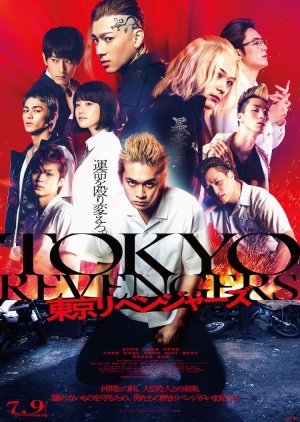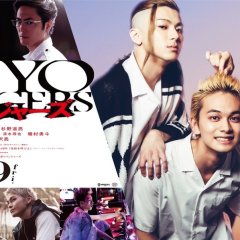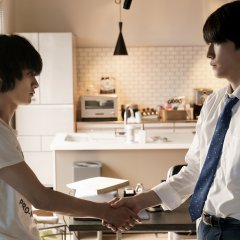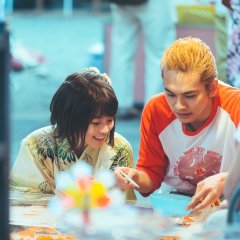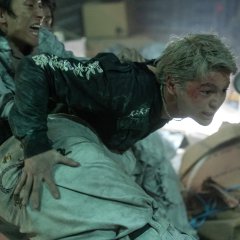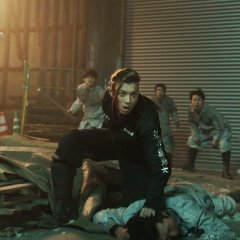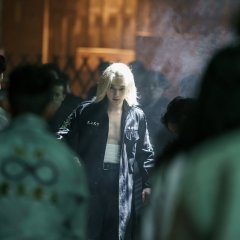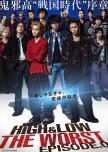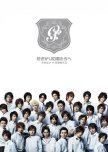 Noodle Cart September 2020
Noodle Cart September 2020 - Français
- 한국어
- 中文(台灣)
- Русский
- Titre original: 東京リベンジャーズ
- Aussi connu sous le nom de: Tokyo Ribenjazu
- Scénariste: Takahashi Izumi
- Réalisateur: Hanabusa Tsutomu
- Genres: Action, Crime, Jeunesse, SF
Où regarder Tokyo Revengers
Subscription (sub)
Distribution et équipes
- Kitamura TakumiHanagaki Takemichi / "Takemitchy"Rôle principal
- Sugino YosukeTachibana Naoto [Hinata's brother / Detective]Rôle Secondaire
- Yoshizawa Ryo"Mikey" / Sano Manjiro ['Tokyo Manji' Leader]Rôle Secondaire
- Yamada Yuki"Draken" / "Kenchin" / Ryuguji Ken ['Tokyo Manji' vice-leader]Rôle Secondaire
- Imada MioTachibana Hinata / "Hina" [Naoto's sister / Takemichi's girlfriend]Rôle Secondaire
- Isomura Hayato"Akkun" / Sendo Atsushi [Takemichi's friend]Rôle Secondaire
Critiques

La revanche des adaptations en live
Voilà un film coup de poing pour rendre hommage à un manga, on ne peut plus populaire, mais pour ma part, surévalué. J'avoue avoir regardé l'annonce de l'adaptation en live action un peu de haut, vu le peu d'intérêt que le premier épisode en anime a suscité chez moi. Cette énième histoire de voyage dans le temps, et en particulier ses retours incessants à l'adolescence commence à me laisser froid. Si on rajoute à cela des graphismes ou une animation sans éclats, (GTO où es-tu ? J'y reviendrai) et un scénario sans subtilité, avec des retours dans le temps, comme ça, juste avec des poignées de mains, j'accroche vraiment peu. Même pas un petit convecteur temporel ou des lettres qui font le voyage plutôt que les humains. Et surtout une banale histoire pour sauver sa bien aimée. Ok, ce n'est pas sa mère morte ou son père emprisonné, mais justement, on n'est pas loin du preux chevalier qui va sauver sa princesse. Un loser sans charisme, qui comme dans tout (bon/mauvais) shōnen, gagnera en skill le long des chapitres. Non, seul l'Opening Cry Baby, des Official Hige Dandism avait attiré mon attention sur cet œuvre et était là raison de visionner le 1er épisode de l'animé et pas les autres donc... et pourtant.Alors pourquoi m'infliger le live action alors qu'il est de coutume pour un occidental de considérer celui-ci raté et ridicule, avant même de l'avoir vu ? Parce que c'est une "Putain de réussite de bon film d'action", tout simplement. Un popcorn movie qui remplie à 100% son rôle d'exutoire de votre violence trop contenu depuis deux ans. Il faut dire que la production a mis le paquet : le budget maquillage a explosé tant l'hémoglobine dégouline de ses combats entre Bosozoku qu'on croyait disparu depuis GTO. Les boites de sparadrap sont ouvertes par caisse et les coupes de cheveux nécessitent un ratio laque/coloration égale par fûts entiers. Honnêtement, c'est vraiment les costumes et le maquillage qui est la grande réussite de ce revival des mangas/animes/dramas/movies de Bosozoku des années 80/90. Mais alors pourquoi avoir placé l'histoire principale en 2010 ? Ok, nos adolescents héros sont has been à mort. Mais finalement pas tant que ça, au vu des clans encore actifs qui finiront par nourrir la pègre japonaise, 10 ans plus tard. C'est bien cet anachronisme qui choque le plus. Plus que l'improbabilité scientifique et scénaristique qui en découle. Les scènes de cascades à part quelques exagérations de défenestration sont plutôt réalistes et les acteurs crédibles, malgré évidement des doublures. Mais ça passe et si vous cherchez réellement un film ou ça tape, vous serez agréablement surpris. Les côtes brisées durant un combat ne les arrêteront pas, ce qui laisse présagez des fight scènes longues et intenses, de la chorégraphie avec des longs manteaux qui volent au ralenti et des cheveux longs et blonds qui flottent dans le vent.
Et de la blondeur, vous en aurez. C'est aussi un des points qui m'a gêné dans le manga. Les ados ayant tous des gueules d'anges alors qu'ils se destinent à être des Yakuzas. Dessins trop enfantins pour l'œuvre originale, à l'annonce des acteurs principaux pour le film, je n'étais pas plus rassuré. Mais clairement curieux de voir le chanteur (et acteur de drama) romantique Kitamura Takumi en chef de gang. C'est vrai que Dish est plutôt connu pour ses musiques pop sucrées, Kitamura pour sa voix androgyne et ses seconds rôles de loser romantique plutôt que de loser des free fight. Je ne doutais pas que Yamada Yuki ferait un excellent Draken tant par le physique, le charisme, le jeu, le regard que par l'accent des bas-fonds et bien sûr, il ne m'a pas déçu, mais Takumi Chan, quand même. Mais finalement, le choix se révèle judicieux et Kitamura m'impressionne une fois de plus par son talent. Bien qu'il traine blessures, pansements et taches de sang durant 90% du film, il est juste à chaque scène. Jamais grotesque dans ses cris, son impuissance ou même ses prises de coup de sang nécessaires à tout shōnen. Un réalisme bien venu que l'on retrouve chez Yamada Yuki et qui tranche avec le personnage de Mikey bien trop bipolaire pour le rendre crédible. Non pas que Yoshizawa Ryo joue mal, mais cette gentillesse, combinée à cette violence, n'est pas crédible du tout. Encore moins face à la gent féminine. Si le retour dans le passé est de 10 ans sur le papier, certaines attitudes face au sexe "faible" (et là, je le fais exprès) sont à chercher du côté de l'age de pierre. Les limites de l'adaptation de personnage de manga en vrai. Comme cet étrange binoclard de service qui remonte ses lunettes au ralenti pour montrer à quel point il est manipulateur. À peine croisé dans le film, j'imagine qu'il prend une autre importance dans l'histoire originale, comme le frère de l'héroïne qui transpire le mec louche ou la sous-exploitation à l'écran des personnages féminins, relégué en faire valoir des mecs. Imada Mio hérite encore d'un second rôle de support du héros et je rêverai qu'elle prenne de l'épaisseur dans une suite pour donner tout son talent et quelques nions à ses machos. Résumé en deux heures, tout n'est surement pas dit dans le film et je me doute bien vu le succès de celui-ci que suite il y aura, car on est vraiment sur notre fin au générique. Ce qui évidement nous obligera à nous plonger dans l'anime/manga, pour en savoir plus. La revanche de mes premiers amours d'il y a 10 ans (ok plutôt 30), sur une trop grande passion actuelle des live action, en quelque sorte.
Cet avis était-il utile?

Marshmallow-Chocoholic
19 personnes ont trouvé cette critique utile
A Worthwhile Adaptation…
Adapting a popular manga and anime series to a live-action movie can be a case of trial and error with attempting to appease newcomers and fans alike rarely ending in overall success. Nevertheless Tsutomu Hanabusa and Izumi Takahashi decided to take on the challenge of mangaka Ken Wakui’s popular series ‘ Tokyo Revengers’ to the big-screen with an adrenal-infused movie that delivered all of the franchise’s punches and blows.
Akin to its original source material the movie focused upon deadbeat " loser" Takemichi Hanagaki ( Takumi Kitamura). At twenty -six years old and stuck in a job that he absolutely loathes with the passion , Hanagaki soon comes to the conclusion that he’s reached a stalemate with life-given opportunities . However fate has other plan for the unlikely hero.
Hanagaki stumbles upon the revealed truth that his ex-girlfriend Tachibana Hinata ( Mio Imada) perished at the hand of the notorious Tokyo Manji Gang. When Hanagaki is given a golden-opportunity to travel back in time to save his former-girlfriend from her violent death, Hanagaki becomes determined to do whatever it takes to save Hinata. The " crybaby hero" is forced to befriend the Manji group’s unlikely leader Mikey"( Yoshizawa Rio), and his right-hand man " Draken" ( Yamada Yuki) as he attempts to infiltrate the gang and prevent domino- effect -events from occurring through his timeline. However as Takemichi works together with Hinata’s younger brother and detective Tachibana Naoto ( Sugino Yosuke),Takemichi’s life begins to diverge in new directions as he dives deeper into the underworld of delinquents…
Tokyo Revengers’ has always had a “ love-hate” relationship with fans and enthusiasts alike. Whilst many have praised mangaka Ken Wakui’s popular series for its intriguing setup and characters, the series has always hit a rut with audiences over two notable flaws : the believability of its ensemble of teen characters actually acting and being their age, as well as the plot holes and loops which remain greatly prominent in the manga writer’s well-known work. In many ways Takahashi and Hanabusa are subtly decisive within the included elements in their adapted live-action movie.
Of course the director and screenwriter are careful not to stray too far away from the source material. On the other hand subtle changes can become prominent to audiences through certain directions of the storyline and especially with consideration to the age of the characters. Takahashi presented the characters as slightly older than their original counterparts; arguably resonating with audiences by the complex journey of adolescence reflected through the allegorical harshness of reality and experiences onscreen.
Paired together with Takahashi’s kaleidoscope of eclectic genres from mystery to action and then romance, there’ s a gritty-edge to Hanabusa’s focus upon fight scenes which add a notable focus upon violence throughout the movie.
Although silly and lighthearted gags transcended onto the big-screen from Wakui’s manga in order to lighten up heavy-angst and fist fights, Hanabusa downplayed comic relief a lot in his adaptation. Instead the movie’s pacing could feel heavily impacted by the blows and fists of its onscreen characters. The elements of comedy which heavily dominated Wakui’s work against darker panels were sparingly dispersed throughout the film; necessary padding at times but gradually beginning to unravel the storyline’s loose-ends.
As the film’s narrative progressed it became evident to audiences that there was an evident disparity in fight scenes. Arguably Hanabusa’s defence against main lead Takemichi Hanagaki being a visible weakling who is often beat up is excusable to a certain extent as he’d rarely escape from a fight or brawl scene unmarked. Nevertheless there was an unintentional farcical element as the storyline progressed with the contrast between realistic physical strength amongst those engaged in the action soon growing clearly visible for audiences.
Of course Hanabusa wasn’t entirely devoid of coherency when attempting to film the fight scenes of the movie. Together with the help of Tomo Ezaki , there was something surprisingly pacy about stunning visuals coinciding against emotional punches especially as the climax began to arise. However the movie’s climax did help to mark drawing up the fight for audiences, the delivered result of aesthetic and visual brawl sequences could often feel like a coated exterior to draw attention away from the anticlimactic buildup of initial events and the delivered result.
Another element of the movie which arguably suffered under the restraints of pacing was the romantic relationship between Hinata and Takemichi. It is arguable that Hanabusa did not entirely abandon the onscreen relationship between the main lead and his former-girlfriend as this did arguably remain one of the greatest-driving forces for the storyline and Takemichi’s personal goals. On the other hand it could often feel as though Hanabusa used the romantic element of ‘ Tokyo Revengers’ as merely padding once again again the violence of the series; necessary for framing the storyline and plot-drive but rarely shaping out the relationship and complexities for Hinata and Takemichi with more definitive edges.
Then of course there’s the discussion surrounding the casting choices of our main leads. Whilst there were admittedly a few scenes where audiences had to power through certain wooden line deliverances, it’s undeniable that Kitamura is brilliant as Takemichi. The actor managed to bring out the awkward charm of Hanagaki’s adult-self navigating his past against his rekindled courage and determinism which gradually awakens through Kitamura’s subtle yet profound micro-expressions and intonations. Costarring with Kitamura are Ryo Yoshizawa as Mikey and Yuki Yamada as Draken are astounding in their roles by adding an idiosyncratic ambience to their onscreen personas that is both heartwarming and threatening.
Then there’s Mio Imada as Takemichi’s former-lover. Whilst Imada’s screen time is restricted due to her character’s limited scream appears des , her performance did offer a level of sweet and dynamic charm to her embodied role as Hinata and carried through with natural chemistry towards her costar Kitamura.
The vision of Hanabusa’s work was aesthetic for audiences but admittedly without a few flaws. Exploration into Takemichi’s reasons for time-travelling and the handshake being the ultimatum are left hanging the air in the movie’s tight-paced storyline. Additionally there were often few transgressions ( aside from haircuts and technology) made between the past and present eras for the audience. Whilst it would’ve been ridiculous for the series to have nuanced each time-leap in depth there were certainly a multitude of missed-out opportunities to explore a manipulation of cinematography. This could’ve easily been done in order to highlight a greater sense of pathos and nostalgia by Takemichi as an adult experiencing his youth once more. Despite this the ending delivered audiences with a fairly satisfying and outcome to the events of the movie.
Hanabusa and Takahashi’s adapted live-action movie was an evident challenge from the outset. Whilst the movie is evidently limited to a certain extent carried on by noted flaws from Wakui’s work as well as the director and screenwriter’s own directions having their strengths and limits. Nevertheless ‘ Tokyo Revengers’ was a fairly satisfying and adrenal-ride; pacy at times and slightly tedious in other parts, but engaging and intriguing through its cast and setup tone by Hanabusa and Takahashi.
Cet avis était-il utile?

